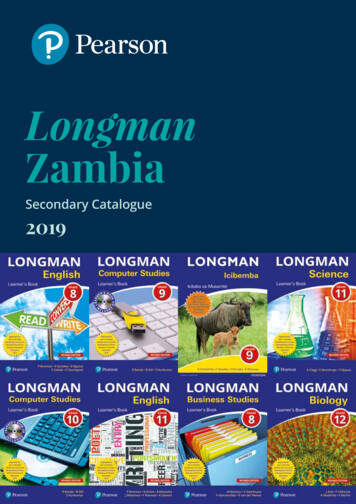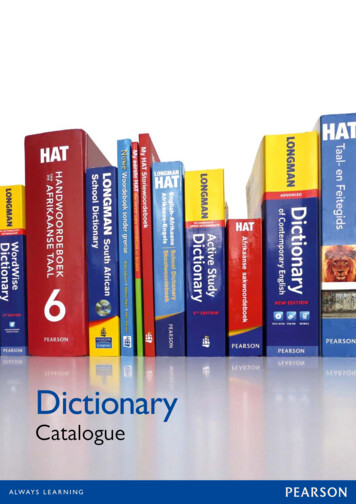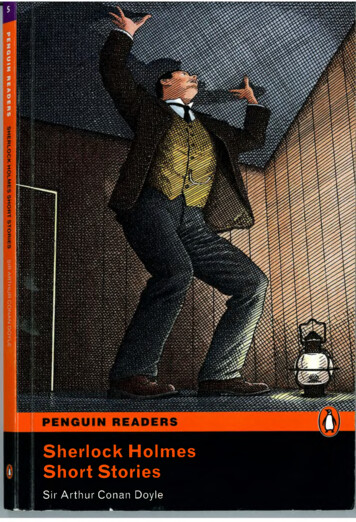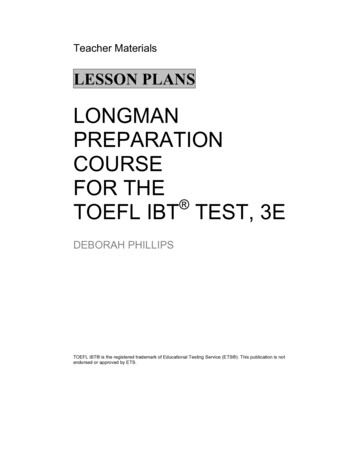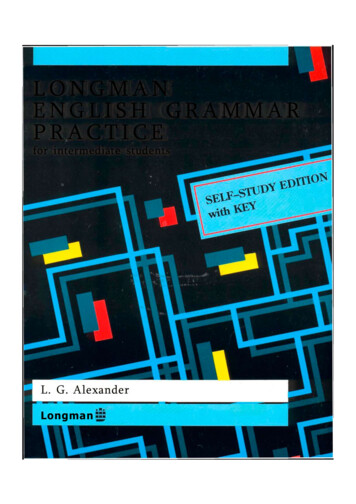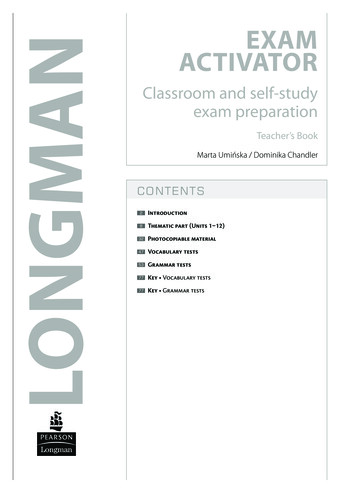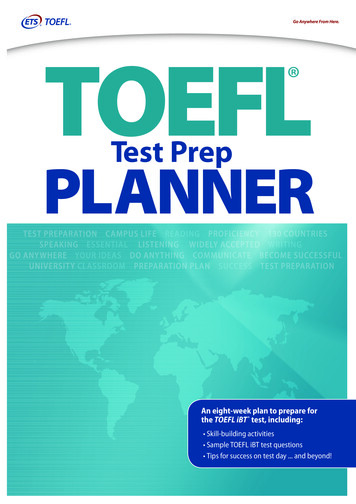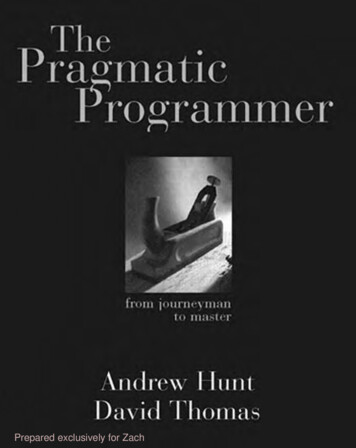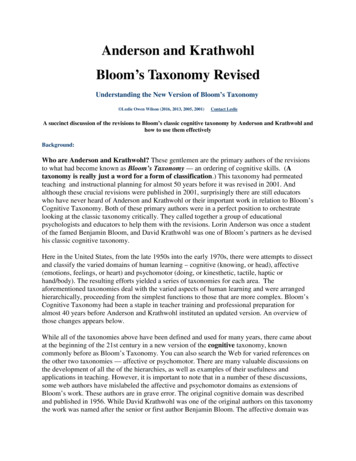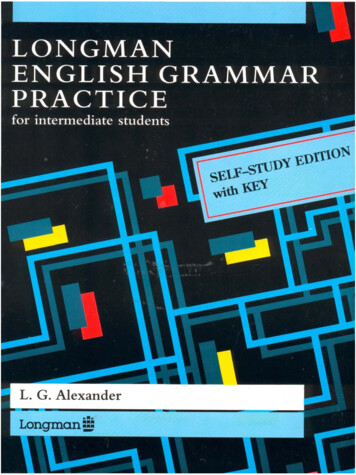
Transcription
LONGMANE N G L I S H GRAMMARPRACTICEfor intermediate studentsL. G. Alexander
Addison Wesley Longman LimitedEdinbur h Gate, Harlow,0 EnglandEssex 8 2 ZJE,and Associated Companies throughout the world.0 Longman Group UK Limited 1990All rights reserved; no part of this publication may bereproduced, stored in a retrieval system, or transmittedin any form or by any means, electronic, mechanical,photocopying, recording, or otherwise, withoutthe prior written permission of the Publjshers.Distributed in the United States of American byAddison Wesley Longman, New YorkFirst published 1990Eleventh impression 1998Cartoons by Larry, Ed Mclaughlin and David SimondsBritish Library Cataloguing i n Publication DataAlexander, L. G. (Louis George) 1932Longman English grammar practice (Intermediate level)1. English language. GrammarI. Title428.2Library of Congress Cataloging-in-Publication DataAlexander, L. G.Longman English gmmmar practice (Intermed atelevel) 1 L G Alexander.p. cm.1. English language - Textbooks for fore gnspeakers2. Engl shlanguage Grammar - 1950 - Problems, exercises, etc i T tlePEll28.A4573 1990428.2'4-&2089-13851CIP-Set in 9111.5 pt. Linotron Helvetica RomanProduced through Longman Malaysia, ACMISBN 0 582 04500 2
ContentsTo the studentThe sentenceSentence word orderThe simple sentence: verbs with and without objectsThe simple sentence: direct and indirect objectsThe compound sentenceThe complex sentence: noun clausesThe complex sentence: relative pronouns and clausesThe complex sentence: 'whose'; defininglnon-defining clausesThe complex sentence: time, place, mannerThe complex sentence: reason and contrastThe complex sentence: purpose, result and comparisonThe complex sentence: present participle constructionsThe complex sentence: perfectlpast participle constructionsNounsOne-word nounsCompound nounsCountable and uncountable nouns ( I )Countable and uncountable nouns (2)Number (singular and plural) (1)Number (singular and plural) (2)GenderThe genitiveArticles7-The indefinite article: 'dan' (1)The indefinite article: Wan' (2)The definite article: 'the' (1)The definite article: 'the' (2)The zero article (1)The zero article (2)PronounsPersonal pronouns'One''It' and 'onelsomelanylnone'Possessive adjectives and possessive pronouns ('mylmine')Reflexive pronouns ('myself')Demonstrative adjslprons ('this'); 'somelanylno' compounds ('someone')QuantityQuantifiers countable and uncountable nounsGeneral and specific references to quantityUses of 'some', 'any', 'no' and 'none''Much', 'many', 'a lot of', '(a) few', '(a) little', 'fewer', 'less''Both' and 'all''All (the)', '(dthe) whole', 'each' and 'every''Another', '(the) other(s)', 'either', 'neither', 'each (one of)'
ContentsAdjectivesFormation of adjectivesPosition of adjectivesAdjectives that behave like nouns; '-edl-ing' endingsAdjectives after 'be', 'seem', etc.; word order of adjectivesThe comparison of adjectivesAdverbsAdverbs of mannerAdverbs of timeAdverbial phrases of durationAdverbs of frequencyAdverbs of degreeIntensifiersFocus adverbsViewpoint adverbs, connecting adverbs and inversionPrepositions, adverb particles and phrasal verbsPrepositions, adverb particles and conjunctionsPrepositions of movement and position; prepositions of timeParticular prepositions, particles: contrasts (1)Particular prepositions, particles: contrasts (2)Particular prepositions, particles: contrasts (3)Phrasal verbs: Type 1, verb preposition (transitive)Phrasal verbs: Type 2, verb particle (transitive)Phrasal verbs: Type 3, verb particle (intransitive)Type 4, verb particle preposition (transitive)Verbs, verb tenses, imperativesThe simple present and present progressive tenses (1)The simple present and present progressive tenses (2)The simple past tenseThe simple past and past progressive tensesThe simple present perfect and present perfect progressiveThe simple past perfect and past perfect progressive tensesThe simple future tenseThe simple future, the future progressive, the future perfect'Going to' and other ways of expressing the futureThe imperativeBe, Have, Do'Be' as a full verb (1)'Be' as a full verb (2)'There' 'be'Verbs related in meaning to 'be''Have' as a full verb 'possess'; 'have got' 'possess''Have' as a full verb meaning 'eat', 'enjoy', etc.'Do' as a full verbModal auxiliaries and related verbsThe two uses of modal verbsUses of modals (etc.) to express ability and inabilityUses of modals (etc.) to express permission and prohibition
Contents11.411.511.611.711.811.911.1011.I 111.1211.13Uses of modals (etc.) to express certainty and possibilityUses of modals to express deductionUses of modals for offers, requests and suggestionsExpressing wishes, etc.: 'I wish', 'if only', 'it's (high) time'Expressing preferences: 'would rather' and 'would sooner''It's advisable .'l'lt's necessary .''It isn't advisable .'/'It isn't necessary .'/'It's forbidden'Modals to express habit: 'used to', 'will' and 'would''Need' and 'dare' as modals and as full verbs'Wouldlwouldn't'; 'that .should'; 'there' modalThe passive and the causativeGeneral information about formUses of the passiveForm and use of the causativeQuestions, answers, negativesYesINo questions, negative statements, YesINo answersAlternative negative forms and negative questionsTag questions and echo tagsAdditions and responsesQuestion-word questions (1): 'Who(m) .?', 'What .?'Question-word questions (2): 'When?', 'Where?', 'Which?', 'Whose?'Question-word questions (3): 'Why?', 'How?'Subject-questions: 'Who?', 'What?', 'Which?', 'Whose?'Questions about alternatives; emphatic questions with 'ever'Conditional sentencesType 1 conditionalsType 2 conditionals 'Type 3 conditionalsMixed conditionals; 'unlesslif. not', etc.Direct and indirect speechDirect speech'Say', 'tell' and 'ask'lndirect statements with tense changesIndirect questions with tense changesUses of the to-infinitive in indirect speechWhen we use indirect speechThe infinitive and the '-ing' formThe bare infinitive and the toinfinitiveThe bare infinitive or the '-ing' form; the toinfinitiveVerb ( nounlpronoun) toinfinitiveAdjectives and nouns toinfinitiveThe '-ing' formVerb the '-ing' formAdjectives, nouns and prepositions '-ing'The toinfinitive or the '-ing' form?IndexKey
AcknowledgementsDifferent versions of these materials were tried out with students in five countries. The book is in itspresent form partly as a result of the useful reports and in many cases the very detailed commentsreceived while the work was being developed. I would like to thank the following:BrazilGermanyVera Regina de A Couto and staffRosa LenzuenLouise TowerseyMichael WatkinsWerner KiewegNorman LewisGreeceItalyCultura Inglesa, RioCultura Inglesa, CuritibaUniversity of Munich,Gymnasium WildeshausenRobert NowacekVolkshochschule, KaufbeurenSandra KlapsisJoanna MalliouHomer Association, AthensGeorge RigasThe Morai'tis School, AthensPaola Giovamma OttolinoLiceo Linguistico, A. Manzoni, MilanoUnited Kingdom Sue BoardmanPat LodgeBell School, Saffron WaldenAlan FortuneEaling cdllege of Higher EducationMary StephensEurocentre, BournemouthM. MilmoSteve MooreJennifer SwiftAnn TimsonJosephine von WaskowskiEurocentre, Lee GreenI would also like to thank:- Donald Adamson and Neville Grant for their detailed and stimulating commentaries and particularlyRoy Kingsbury for his comprehensive report and notes on exercise-types.- my personal assistant, Penelope Parfitt, and my wife, Julia, for reading and commenting on thework at every stage of its development.I am especially grateful to my publishers and their representatives for administering and monitoring thetrialling of the manuscript in various locations round the world and for exercising such care and skill tosee the work through to publication.1
To the studentWhy do we learn grammar?There is no point in learning grammar for the sake of learning grammar. Grammar is the supportsystem of communication and we learn it to communicate better. Grammar explains the why and howof language. We learn it because we just can't do without it.Who is this book for and what does it cover?This book deals entirely with English as a foreign language (EFL). It is for intermediate students whoare working with a teacher or working on their own. It covers every important area of the Englishlanguage. If you look at the Contents pages, you will find sixteen major areas which form the basis ofEnglish grammar. This book is based on the Longman English Grammar and the grammaticalinformation in it is all drawn from this work. Longman English Grammar Practice has been designed tostand on its own. Students who require further grammatical information can refer to the LongmanEnglish Grammar.How the material is organizedLongman English Grammar Practice is a practice book. It is intended to support (not replace) thematerial in language courses and is organized for this purpose:The material is laid out on facing pages.Each set of facing pages deals with a major point of grammar.This major point is divided into small, manageable amounts of information. Clear notes explain thepoints to be practised, followed by an exercise on just those points.The last exercise is in context, usually an entertaining story with a cartoon illustration. It sums up allyou have learnt in the exercises you have just done and shows you how the language works. It is a'reward' for the hard work you have just been doing!".Cross referencesIf you see e.g. [ 7.3A] in the notes, it means that a similar point is discussed in some other part of thebook. Follow up the reference for parallel practice or information if you want to. If you see e.g. [ LEG4.301 at the top of the notes, it means that the point is dealt with in the Longman English Grammar.Follow up the reference if you want 'the whole story'.How to workYOU DON'T HAVE TO WORK THROUGH THIS BOOK FROM START TO FINISH!It is not arranged in order of increasing difficulty.Select a chapter or part of a chapter which you want to study. Do this by referring to the Contentspages or the Index. Usually, this will be a topic you have been dealing with in your languagecourse. Then:1 Read the notes carefully (called Study). Notes and exercises are marked like this: Elementary I**I Intermediate (most exercises) I***I AdvancedYou will sometimes find that you know some, but not all, of the points in an exercise marked El.2 Do the exercises (called Write). Always leave the story till last (called Context).3 Check your answers with your teacher.4 If you have made mistakes, study the notes again until you have understood where you wentwrong and why.
1 The sentence1.1 Sentence word order1.1 AStudy:The basic word order of an English sentence [ LEG I .3]The meaning of an English sentence depends on the word order.1 We put the subject before the verb and the object after the verb:The cook I burnt I the dinner.2 Adverbials (How?, Where?, When?) usually come after the verb or after the object:He read the note quickly. (How?) I waited at the corner (Where ?) till 11.30. (When?)3 The basic word order of a sentence that is not a question or a command is usually:subjectverbobjectadverbialsHow?Where? When?Iboughta hatyesterday.The children have gonehome.Weateour meal in silence.Write 1:a Rewrite the sentences that don't make sense.b Mark all the sentences in the exercise S V 0 to show Subject, Verb, Object.Has set John Bailey a new high-jump record. I S I J % . @ . h a d . & . I 8 R a a w . The passport examined the passport officer. .These biscuits don't like the dogs. .The shop assistant is wrapping the parcel. .Have seen the visitors the new buildings. .My father didn't wash the dishes. .The pipe is going to fix the plumber. .Will the goalkeeper catch the ball? .Has the meal enjoyed the guest? .Can't play John the game. .Write 2:- .a Arrange these words in the right order. Use a capital letter to begin each sentence.b Mark each rewritten sentence S V 0 M P T to show:Subject, Verb, Object, Manner (How?),Place (Where?),Time (When?).till 11 o'clock this morning I slept I the c h i l d r e n ( s R . & . * . . v I . . . ! ! . ' . . . .the papers I into the bin I he threw .I don't speak I well I English .hides I Mrs Jones I her money I under the bed .carefully I this suitcase I you didn't pack .on this shelf I I left I this morning I some money .from the bank I a loan I you'll have to get .the phone I in the middle of the night I woke me up .in the park I you shouldn't walk I at night .your food I you should sat I slow:y .my term I begins I in October .your article 1 I I quickly 1 last night I in bed / read .
1.1 Sentence word orderThe forms of a sentence [ LEG I .2]Study:I**I1 A sentence can take any one of four forms:- a statement:The shops close/donltclose at 7 tonight.- a question:Do the shops close at 7 tonight?- a command:Shut the door./Donltshut the door.- a n exclamation: What a slow train this is!2 When we write a sentence, we must begin with a capital letter and end with a full stop (.), aquestion mark (?), or an exclamation mark (!).Write:a Arrange these groups of words in the right order. Add (.), (?) or (!).b Describe each sentence as a statement, question, command or exclamation: S, Q, C or E.1 the coffee I don't spill .Dd#.&.Wf%%:.(2 today's papers I have you seen . (c)3 to meet you 1 how nice .(4 my umbrella I where did you put .(5 arrived I the train I fifteen minutes late .(6 on time ( the plane ( won't arrive .(7 this electricity bill 1 I can't pay . (8 for me 1 please I open the door .(9 the nearest hotel I where's I he asked .(10 the bill I can't pay I I 1 he cried .(1.1C ContextWrite:''X.e111111111a .Read this story and arrange the words in each sentence in the right order.Add capital letters and (,), (.), (!) or (?) in the right places.A QUIET SORT OF PLACE!1 my car I I parked I in the centre of the village .Q.@?!?&. . .&.thc-. .C?f.%. 2 near a bus stop I an old man 1 I saw .3 'beautiful village I what a' 1 I exclaimed .4 'live here I how many people' .5 'seventeen people I there are' I the old man said .6 'here I have you lived I how long' .7 'all my life I I have lived here' .8 'isn't it I it's a quiet sort of place' .9 'here I a quiet life I we live .10 a cinema I we don't have I or a theatre .1 1 our school I five years ago I was closed .12 only one shop / we have .13 calls I a bus I once a day .14 here I in 55 B.C. I came I the Romans .15 since then I has happened I nothing' .
1 The sentence1.2 The simple sentence: verbs with and without objects1.2AStudy:(**IWhat is a complete sentence? [ LEG 1.211 When we speak, we often say things like All right! Good! Want any help?These are 'complete units of meaning', but they are not real sentences.2 A simple sentence is a complete unit of meaning which contains a subject and a verb,followed, if necessary, by other words which make up the meaning. So:Made in Germany is correct English but it is not a sentence because it doesn't have a subject.My car was made in Germany. is a complete sentence with a subject and verb.We can't say e.g. *Is tired* because we need a subject [ 4.1A, 4.3AI: He is tired.3 The subject may be 'hidden': Open the door. really means You open the door. [ 9.loBIWrite:Put a tick (J)beside real sentences.12345678910Made in Germany. This car was made in Germany. 1To write a letter. Standing in the rain. 1 want to write a letter. Is tall. Do you like? The train has arrived. Have finished my work. You should listen. -11121314151617181920Sit down please. You can't park here. Don't interrupt. 1 understand. She doesn't like me. under the water. Ate. A bottle of ink. He's a doctor. What happened? -1.2B Verbs with and without objects [ LEG 1.4,1.9,1 .lo,1.12, Study:(**Ip I]p1 We always have to use an object after some verbs: e.g. beat, contain, enjoy, hit, need.We call these transitive verbs. We have to say:Arsenal beat Liverpool. But we can't say *Arsenal beat. *2 Some verbs never take an object: e.g. ache, arrive, come, faint, go, sit down, sleep, snow.We call these intransitive verbs. We have to say:We arrived at 1 1. But we can't say 'We arrived the station at 1 1.3 Some verbs can be used transitively or intransitively: e.g. begin, drop, hurt, open, ring, win.We can say: Arsenal won the match. (transitive) or Arsenal won. (intransitive)Write:Put an object (a pronoun or a noun) after these verbs only where possible.123456789The box contains ./?.&.:. 10The train has arrived . 1 1The phone rang .12Someone is ringing . 13You need .14We sat down . 15Don't hit . 16Did you beat . ? 17Who opened . ? 18The door opened .This is a game no one can win .The concert began . at 7.30.1 began .It's snowing .Quick! She's fainted .Did you enjoy . ?My head aches .My foot hurts .
1.2 The simple sentence: verbs with and without objects1 . X Sentences with linking verbs like 'be' and 'seem'Study:I**)1 Verbs like be [ 10.1-31and seem [ 10.41 are 'linking verbs'. They cannot have an object.The word we use after be, etc. tells us something about the subject. In grammar, we call this acomplement because it 'completes' the sentence by telling us about the subject.In He is ill. She seems tired. etc. the words ill and tired tell us about he and she.2 A complement may be:- an adjective:- a noun:- an adjective noun:- a pronoun:- an adverb of place or time:- a prepositional phrase:Write:[ LEG I .9, I .I I , 10.23-261Frank is clever.Frank is an architect.Frank is a clever architect.This book is mine.The meeting is here. The meeting is at 2.30.Alice is like her father.a Complete these sentences using a different complement for each sentence.b Say whether you have used a noun, an adjective, an adjective noun, etc.m:.(4&4%?1 My neighbour is very .2 My neighbour is .3 This apple tastes .4 The children are .5 The meeting is .6 Whose is this? It's .7 John looks .8 That music sounds .9 Your mother seems .10 1 want to be . when I leave school. .:.'h,.I,.1.2D ContextWrite:'.Read this story and arrange the words in each sentence in the right order.Add capital letters and (,), (.), (!) or (?) in the right places [ 1 .lB].SO PLEASE DON'T COMPLAIN!1 the local school I attends I my son Tim . & ! . . . & . . . . . . . .& :2 to his school ( my wife and I went ( yesterday .3 we I to his teachers I spoke .4 Tim's school report 1 we collected .5 very good I wasn't I Tim's report .6 in every subject I were I his marks I low .7 was waiting anxiously for us 1 outside ) Tim .8 'my report I how was' I eagerly I he asked .9 'very good I it wasn t I I said .10 'you I harder I must try .1 1 seems I that boy Ogilvy I very clever .12 good marks I he got I in all subjects' .13 'clever parents ( Ogilvy ( has' ( Tim said .33
1 The sentence1.3 The simple sentence: direct and indirect objects1.3A Subject verb indirect object direct object: 'Show me that photo'[ LEG 1.131Study:1 We can use two objects after verbs like give and buy.Instead of: Give the book to me, we can say: Give me the book.lnstead of: Buy the book for me, we can say: Buy me the book.2 Some verbs combine with TO: bring, give, lend, pay, post, sell, send, show, tell, write:Bring that book to me. -,Bring me that book.3 Other verbs combine with FOR: buy, choose, cook, cut, do, fetch, find, get, make, order:Please order a meal for me. -,Please order me a meal.4 We can put it and them after the verb: Give it to me. Buy them for me. Do it for me.With e.g. give and buy, we can say: Give me it. Buy me them. (But not 'Do me it')We say: Give it to John. Buy them for John. (Not *Give John it4*BuyJohn them')Write:You want people to do things for you. Write suitable polite requests using it, them or one [ 4.381.1 Where are my shoes? (find) Please .M. . . . : . . f i .n d . . r n C . 2 John needs a new coat. (buy) Please . .\- 3 1 can?.reach that cup. (pass) Please . :.4 Ann wants to see our flat. (show) Please .5 1 can't do the shopping. (do) Please .6 I'd like a copy of that book. (order) Please .1.38 Verb object 'to' noun or pronoun: 'Explain it to me' [ LEG 1.12.11Study:El1 There are some verbs like explain which do not behave in exactly the same way as give.For example, we can say: Give the book to me, or Explain the situation to me.Give me the book. (but not 'Explain me the situation. ')2 We cannot use an indirect object (me) immediately after explain. We can only have:He explained the situation to me.verb object 'to':He confessed his crime to the court.3 Other verbs like explain and confess are: admit, announce, declare, demonstrate, describe,entrust, introduce, mention, propose, prove, repeat, report, say, suggest.Write:Complete these sentences giving the right order of the words in brackets.1 You must declare (the Customs/this camera) .*.&.#'?-.A!.&@@?!:. .2 Aren't you going to introduce (melyour friend)? .3 You can say (melwhat you like) .Who suggested (this idealyou)? .He confessed (his crimelthe police) .1 have never admitted (anyonelthis) .Can you describe :melthis man)? .Please don't mention (thislanyone) .9 I'm going to report (thislthe headmaster) .10 1 don't want you to repeat (what I told youlanyone) .
Longman English gmmmar practice (Intermed ate level) 1 L G Alexander. p. cm. 1. English language - Textbooks for fore gn speakers 2. Engl sh language - Grammar - 1950 - Problems, exercises, etc i T tle PEll28.A4573 1990 428.2'4-&20 89-13851 CIP Set in 9111.5 pt. Linotron Helvetica Roman .
